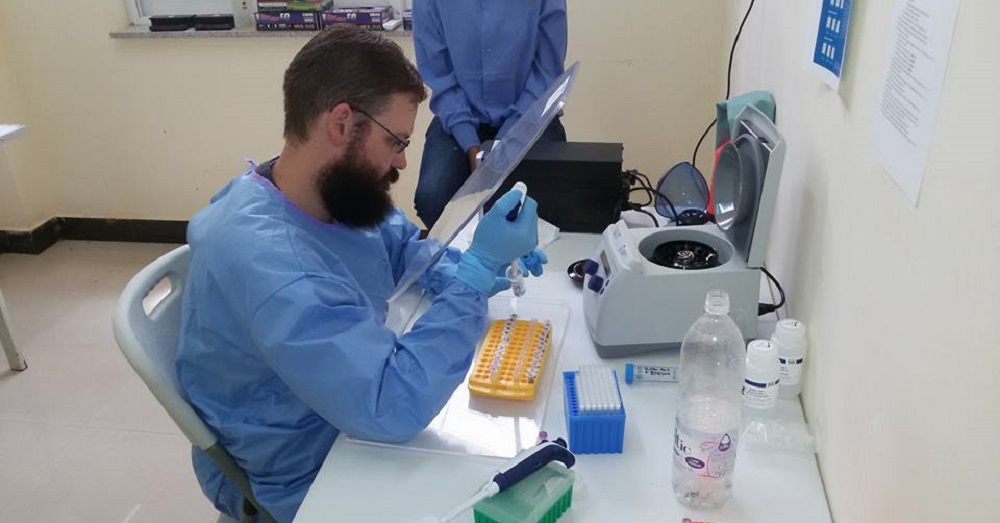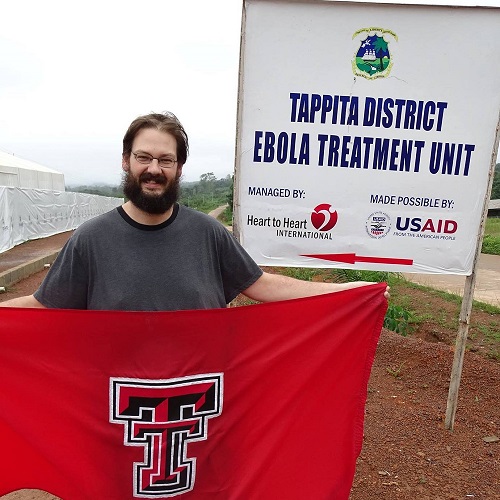Alumni Spotlight: Stephen White, Ph.D.
White credits the education and training he received at TTUHSC for preparing him to face the many challenges he’s encountered in the field.

Stephen White, Ph.D.
Medical Laboratory Scientists (MLS) play a crucial role in modern healthcare, serving as the unsung heroes behind the scenes. These skilled professionals are responsible for conducting intricate laboratory tests, analyzing specimens and providing vital information that aids in accurate diagnoses and effective treatment plans.
With advancements in technology and the increasing complexity of diseases like coronavirus and mpox, the field of Medical Laboratory Science has become more critical than ever before.
We had the opportunity to sit down with TTUHSC alumnus Stephen White, Ph.D., to learn about what led him to the field, the pressures and stressors that laboratory scientists have faced in recent years, and how TTUHSC prepared him for success.
White earned a B.S. in Clinical Laboratory Science (now called Medical Laboratory Science), and an M.S. in Clinical Practice Management from the TTUHSC School of Health Professions, before completing his Ph.D. at Florida International University.
Origin Story: A Rocky Path to the Lab
“My road to clinical lab sciences was a rocky one,” White begins with a chuckle.
White grew up in Austin, Texas, and chose to attend Texas Tech University with an Army ROTC scholarship to study microbiology. However, things didn’t go as planned.
“I had a checkered academic past and didn’t do very well,” he recalls. “I had always wanted to do science, microbiology, infectious disease, but I didn’t know the proper way to do that.”
In 2008, White learned about the Clinical Laboratory Science program in the TTUHSC School of Health Professions and felt it was the right fit for his interests and goals. But, being accepted into the program presented some challenges. Before being accepted, White had to buckle down through the summer to improve his grades; which he did, all with a newborn at home, no less!
Upon graduation, White accepted a position with the South Dakota Department of Health as a Senior Microbiologist in 2010. Eventually, he would end up heading southeast to work with the Florida Department of Health, first as a Bioterrorism Defense Coordinator before becoming a Laboratory Director in 2019.
While living and working in Florida, White earned his Ph.D. in Public Health from
Florida International University, graduating in 2020 in the midst of the coronavirus
pandemic.
“The emphasis of my doctorate was in epidemiology, but you get a taste of a little
bit of everything like behavioral health, maternal child health and biostatistics,”
he explains. “I like to credit my Ph.D. with giving me better research and higher-level
skills.”
In 2022, White accepted a position with the Texas Department of State Health Services that brought him back to Austin.
Fighting Ebola on the Front Lines

Stephen White, Ph.D.
While working as a Bioterrorism Defense Coordinator for the Florida Department of Health, White was tapped to help combat the Ebola virus outbreak in West Africa.
“I went over in 2015 with the goal of helping to set up the infrastructure and diagnostics for Ebola testing. It was a new disease for them,” White remembers. “So I went over and took over a lab from the US Army that they had set up.”
After saying goodbye to his family and friends, White found himself in Tappita, a small town nestled in what felt like the middle of nowhere. It would become his temporary home as he embarked on a mission to fight the devastating disease.
“Each day, we would receive samples from suspected cases, and it was our task to swiftly and accurately determine their infection status. This was a critical step in containing the virus, as it allowed for the identification and isolation of infected individuals, preventing further spread,” White says.
White worked in Liberia for six months until the CDC extended his role to a 15-month stay.
“I was on a hiatus from the Florida Department of Health at that point, so I quit my job in Florida and ended up moving my family over,” White says. “Our youngest daughter turned 1 on the day we moved to Liberia.
The Effects of COVID-19 on Lab Scientists
Laboratory scientists have faced numerous challenges during the COVID-19 pandemic. There was a severe shortage of testing supplies and equipment, hampering their ability to conduct widespread testing efficiently. They had to rapidly adapt their existing protocols and infrastructure to handle the high volume of tests, requiring significant resources and coordination, putting a strain on both the personnel and the laboratory systems.
“I was the lab director of the public health lab in Miami during COVID,” White remembers. “For the first six months of COVID, I was working 14, 15, 16 hour days, everyday.”
One of White’s goals as a director is for his employees to receive the recognition and compensation they deserve. The COVID-19 pandemic brought the need for qualified lab scientists to the forefront, while also revealing many divisions with society when it comes to public health and prevention.
“People either love us or hate us,” White says. “If we’re doing our job well, you don’t know we exist.”
White believes the COVID-19 pandemic has shown the value of being prepared for future outbreaks.
“We need to build out the structures now,” he says.
Medical Laboratory Science at TTUHSC
The Medical Laboratory Science program at TTUHSC is designed to train students in the field of clinical laboratory diagnostics. Students gain hands-on experience in state-of-the-art laboratories, learning essential skills for accurate diagnosis and patient care.
White credits the education and training he received at TTUHSC for preparing him to face the many challenges he’s encountered in the field. He also believes that, because of the heavy reliance on laboratory diagnostics in medicine, the MLS path would provide a solid foundation for an aspiring physician.
“Not only did I get the skills that I needed, it formed the foundation for everything, including the work that I do now,” he says.
Related Stories
TTUHSC Receives $1 Million Gift from Amarillo National Bank to Expand and Enhance Pediatric Care in the Panhandle
TTUHSC School of Medicine leaders accepted a $1 million philanthropic gift from Amarillo National Bank on Tuesday (Feb. 10), marking a transformational investment in pediatric care for the Texas Panhandle.
Texas Tech University Health Sciences Center Permian Basin Announces Pediatric Residency Program Gift
TTUHSC Permian Basin, along with the Permian Strategic Partnership and the Scharbauer Foundation, Feb. 5 announced a gift that will fund a new pediatric residency.
The Ph.D. Programs that Shape Health Care
The Graduate School of Biomedical Sciences Ph.D. programs at TTUHSC provide the foundation, mentorship and research opportunities you need to pursue groundbreaking work.
Recent Stories
National Academy of Inventors Names TTUHSC Faculty Senior Members
The National Academy of Inventors (NAI) has designated two current and one former TTUHSC faculty researchers as Senior Members.
The John Wayne Cancer Foundation Surgical Oncology Fellowship Program at Texas Tech University Health Sciences Center Announced
TTUHSC is collaborating with the John Wayne Cancer Foundation and has established the Big Cure Endowment, which supports the university’s efforts to reduce cancer incidence and increase survivability of people in rural and underserved areas.
TTUHSC Receives $1 Million Gift from Amarillo National Bank to Expand and Enhance Pediatric Care in the Panhandle
TTUHSC School of Medicine leaders accepted a $1 million philanthropic gift from Amarillo National Bank on Tuesday (Feb. 10), marking a transformational investment in pediatric care for the Texas Panhandle.
